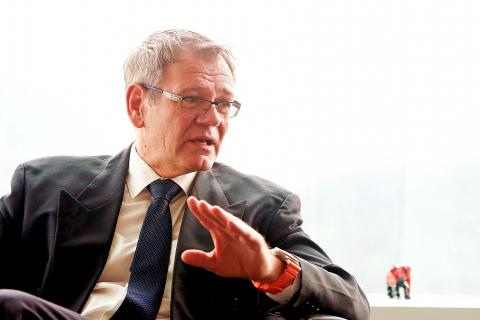Germany recognizes the role that Taiwan plays in international affairs and supports its participation in global forums, German Institute Taipei Director-General Thomas Prinz said.
Germany recognizes “the constructive role Taiwan plays in international affairs,” Prinz told reporters in an interview on Wednesday, adding that the country would therefore support Taiwan wherever it can within the framework of its “one China” policy.
“Of course we would like to see Taiwan contributing and cooperating in the international forum,” said Prinz, citing the World Health Assembly and Interpol. “But unfortunately that is not in our hands, we try to support Taiwan, but the given situation is quite complicated.”

Photo: CNA
Regarding current cross-strait relations, which have been strained since President Tsai Ing-wen (蔡英文) assumed office in May 2016, Prinz said that any step taken by each side to reduce tensions in the Taiwan Strait would be appreciated.
“Nobody can win in a violent conflict. I think China is aware of that. The stability in this part of the region is in the utmost interest of all the stakeholders,” he said.
The international community needs China as a constructive partner — especially on issues related to climate change and the WTO — and China needs partners as well, Prinz said.
“In the end we all profit from a rules-based international order,” he added.
Calling Taiwan a like-minded democracy, Prinz said that Germany would continue to support it “as much as we can under the difficult circumstances.”
Regarding his country’s experience with transitional justice, Prinz said that it is not about seeking retribution against historical perpetrators or destroying a specific political party, but about creating harmony in society and addressing the injustices of the past.
Germany launched a transitional justice policy after reunification in 1990, when the German Democratic Republic became part of the Federal Republic of Germany.
Thousands of German citizens were victims of the former communist system in East Germany “who were spied on by their neighbors, sometimes by their families,” Prinz said. “These people wanted to know what has happened.”
In response to such demands, the new German government opened the files kept by the East German State Security Service, commonly known as the Stasi, to the general public, for everyone to consult, Prinz said.
Openness and making such files available were important to restoring truth and justice, he added.
Another lesson that Germany learned in the process of seeking transitional justice is that “we do not take revenge,” Prinz said.
“If you start taking revenge, you open a new area of conflict,” he added.
For instance, if the government puts perpetrators in jail or takes away their assets, such moves can alienate people “to an extent where they will not play a constructive role in society,” he said.
“So that is what we learned from our experience, to find a more or less harmonious way to deal with it without opening new lines of conflict,” he said.
Regarding the Chiang Kai-shek Memorial Hall, which the Democratic Progressive Party government considers a “controversial space” that needs to be recharacterized, Prinz said that he considers the buildings part of history.
“You can’t extinguish history by demolishing a building,” he said. “Sometimes it is better to put the monuments or the buildings in a certain frame to explain why they are there, to explain what happened in this time, instead of demolishing them.”
Giving monuments or buildings a “new democratic context,” “opening them for civil society to use and other purposes” would be a good choice, he added.

Alain Robert, known as the "French Spider-Man," praised Alex Honnold as exceptionally well-prepared after the US climber completed a free solo ascent of Taipei 101 yesterday. Robert said Honnold's ascent of the 508m-tall skyscraper in just more than one-and-a-half hours without using safety ropes or equipment was a remarkable achievement. "This is my life," he said in an interview conducted in French, adding that he liked the feeling of being "on the edge of danger." The 63-year-old Frenchman climbed Taipei 101 using ropes in December 2004, taking about four hours to reach the top. On a one-to-10 scale of difficulty, Robert said Taipei 101

Nipah virus infection is to be officially listed as a category 5 notifiable infectious disease in Taiwan in March, while clinical treatment guidelines are being formulated, the Centers for Disease Control (CDC) said yesterday. With Nipah infections being reported in other countries and considering its relatively high fatality rate, the centers on Jan. 16 announced that it would be listed as a notifiable infectious disease to bolster the nation’s systematic early warning system and increase public awareness, the CDC said. Bangladesh reported four fatal cases last year in separate districts, with three linked to raw date palm sap consumption, CDC Epidemic Intelligence

Two Taiwanese prosecutors were questioned by Chinese security personnel at their hotel during a trip to China’s Henan Province this month, the Mainland Affairs Council (MAC) said yesterday. The officers had personal information on the prosecutors, including “when they were assigned to their posts, their work locations and job titles,” MAC Deputy Minister and spokesman Liang Wen-chieh (梁文傑) said. On top of asking about their agencies and positions, the officers also questioned the prosecutors about the Cross-Strait Joint Crime-Fighting and Judicial Mutual Assistance Agreement, a pact that serves as the framework for Taiwan-China cooperation on combating crime and providing judicial assistance, Liang

US climber Alex Honnold left Taiwan this morning a day after completing a free-solo ascent of Taipei 101, a feat that drew cheers from onlookers and gained widespread international attention. Honnold yesterday scaled the 101-story skyscraper without a rope or safety harness. The climb — the highest urban free-solo ascent ever attempted — took just more than 90 minutes and was streamed live on Netflix. It was covered by major international news outlets including CNN, the New York Times, the Guardian and the Wall Street Journal. As Honnold prepared to leave Taiwan today, he attracted a crowd when he and his wife, Sanni,